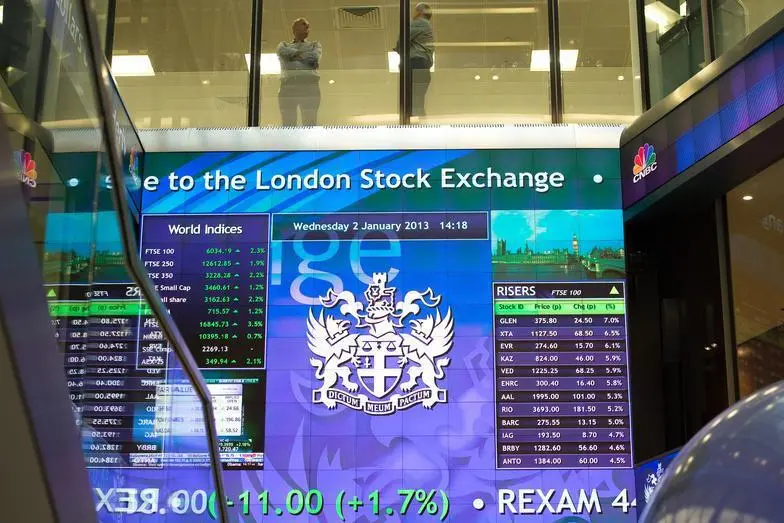PHOTO
LONDON - Global shares wilted and U.S. yields climbed multi-year highs on Friday after a week packed with central bank meetings signalled that the U.S. Federal Reserve's interest rates would stay higher for longer.
The yen traded at 148.31 to the dollar, after falling sharply earlier in the day following the Bank of Japan's decision to hold interest rates in negative territory, suggesting it was in no rush to phase out its massive stimulus programme.
The dollar, up 0.2%, was headed for its 10th consecutive weekly increase, lifted by a fall in the euro on grim euro-zone economic data.
Oil prices were above $90 a barrel, though on track for a small weekly drop after gaining more than 10% in the previous three weeks amid concerns about tight global supply.
The mounting risk of a U.S. government shutdown in just 10 days was also being watched by markets.
MSCI's index of global equities was slightly weaker and down about 2.6% for the week so far.
Benchmark 10-year U.S. Treasury yields hit a 16-year high of 4.508%, trading at 4.478% in Europe, while 30-year yields hit their highest in a dozen years. They were trading at 4.55%, up slightly on the day.
A re-assessment of the Fed's higher-for-longer policy was driving the rise in yields, creating headwinds for risk assets such as equities, credit and emerging markets, but supporting the dollar, ING bank said.
"The massive week for central banks has really been all about the Fed. That is the focus of the market and that's what's driving the dollar right now," said Eren Osman, managing director of wealth management at Arbuthnot Latham.
The Fed revised downwards its unemployment rate forecast for next year, and if the U.S. economic data continued to improve, it would put "upside risk" on interest rates, making the need for a soft landing all the greater, Osman added.
In sharp contrast with the U.S. economy, the euro zone economy will likely contract in the third quarter and won't return to growth anytime soon, HCOB's flash purchasing managers' index showed, hitting the euro and yields.
Weighing further on sentiment, German busines activity fell for the third straight month in September, pointing to a deep economic contraction in Europe's biggest economy.
The pan-European STOXX 600 share index was down 0.45%, adding to its losses for the week.
U.S. stock futures were slightly firmer after Wall Street fell on Thursday on worries that the Fed, which paused on rate hikes on Wednesday, will nevertheless keep borrowing costs at current levels for longer than previously anticipated.
Speeches from Fed officials Mary Daly, Neel Kashkari, Susan Collins and Lisa Cook are due later.
WATCHING DOLLAR/YEN
MSCI's index of Asia-Pacific shares ex-Japan touched a 10-month low before bouncing 0.5% on vows in China to support private business. It is down 2.8% this week.
The yen eased on news from the BoJ, with traders extra wary of intervention after the BOJ noted it was watching the impact of FX moves on Japan's economy.
"It just puts markets further on notice that it's not a green light to be buying dollar/yen with impunity," said Ray Attrill, head of FX at National Australia Bank in Singapore.
Japan's Nikkei pared losses of as deep as 1% to trade 0.5% lower.
Ten-year Japanese government bond futures rallied though cash yields were little changed and near decade highs at 0.745%.
Investors were still digesting a slew of policy decisions from major central banks during the week.
Fed members had lifted their median projection for the funds rate in 2024 by 50 basis points (bps) to 5.1% and traders shaved about 15 bps from implied futures pricing, which has rates at 4.7% at the end of next year.
Central banks in Sweden and Norway announced 25 bp hikes with the prospect of more to come.
Yet the Bank of England, in a split decision, left rates on hold for the first time in nearly two years, sending sterling to a six-month low, while the Swiss franc fell sharply after a surprise hold on rates from the Swiss National Bank.
"It's a lot of mixed messages and stories, and often you get those around turning points," said Craig Ebert, senior economist at BNZ in Wellington.
In emerging markets, Indian bonds and the rupee rallied after JPMorgan said it would add Indian debt to its widely tracked emerging markets index, setting the stage for billions of dollars in foreign inflows.
Gold firmed 0.3% to $1,926 an ounce despite pressure from the stronger dollar and bond yields.
(Reporting by Huw Jones, additional reporting by Tom Westbrook; Editing by Edmund Klamann, Kim Coghill and Rashmi Aich)




















